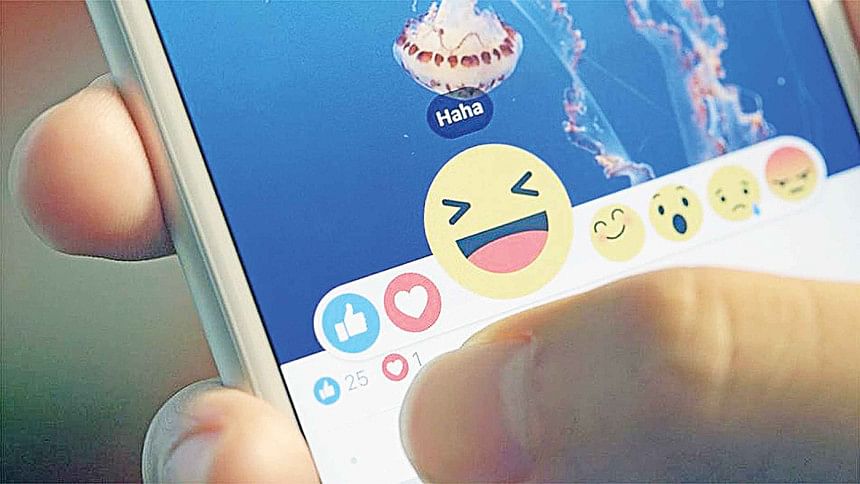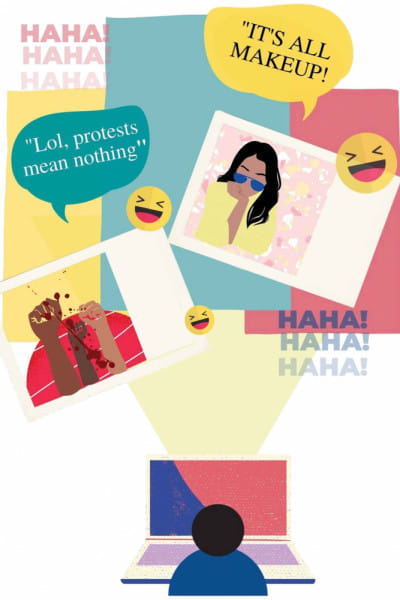The Problem With Facebook’s Haha React

Before getting to the main point of this article, I would first like to talk about a few posts – mostly news stories – which I have come across on my Facebook newsfeed in the past few months.
I saw women of all ages take to the streets and protest against the growing number of rape and sexual harassment cases; a powerful sight, and something that had become a necessity, given the circumstances. A TV personality cut ties with her husband, and settled down with another man; everyone involved in this had no ill thoughts regarding each other, and it was nothing odd. Another popular sports personality was seen inaugurating an event of a different faith, a completely normal occurrence.
I also came across disgusting stories of how underage boys were being molested by their teachers. I saw religious minorities having their homes, and places of worship, vandalised. And I saw news of loss and death due to the ongoing pandemic.
Besides all this, my news feed also had posts from different people, from different professions and lifestyles, posting their thoughts, pictures, videos, and so on. Nothing wrong here as well; normal people doing what they feel like without hurting others.
To the sane human mind, they are just random Facebook posts, but to many, all of these posts seemed funny. Despite the subject matter behind these posts, or the reasons as to why such events were taking place, I saw many people ridiculing these stories, and trying their best to make a mockery out of those involved. And at the base of all this meaningless ridicule on such Facebook posts, I noticed one thing sticking out like a sore thumb – the "Haha" react, and the laughing emoji associated with it.

When Facebook first introduced the concept of "reactions", the idea was to get people to say more with less. You see a heartfelt post – hit the "Love" react. Read a sad news story? Click the "Sad" react.
Of course, not everyone thinks the same, and not everyone needs to. A post that looks like a "Love" react to you will seem like a "Wow" to others. There are people who will fool around with you, mostly friends, by hitting a Haha react on that profile picture of yours. All this is fine when it is just a few people who are doing so, or part of harmless fun within a circle.
However, things can get out of hand.
If a post has 100 reactions, and the Love, Like, and Wow reacts are the ones used the most, only these three will appear under that post, arranged in order of most used ones first, and least used ones at the end. Although you can see the full breakdown as to who reacted with what when you click the post, the first thing you will see is the selection of the most used reactions. This, according to Julie Zhuo, a former product design director at Facebook, was done so that "somebody, who is just scanning their newsfeed at a glance, could understand the general sentiment of how people are reacting to the story". And this is where our problem begins.
These inappropriate reactions start piling up with a few individuals trying to act funny, and hitting that Haha react, which in turn, triggers 10 others to do the same. All on a sudden, you see that a news story covering a protest against sexual violence has a ton of Haha reacts on it, as if the whole matter is a joke. And the fact that the emoji associated with this reaction sits at the front of the stack does not help either. It simply establishes the idea that the post is indeed "funny", or that it deserves the sort of bashing it is getting.
The "general sentiment" of a post, that holds a lot of emotion, and speaks volumes, thus, becomes something of a joke within a few minutes.
While a lot of people are willingly trying their best to make a mockery out of these posts, there are many others who are hitting that Haha reaction, not because they understand the situation, and still find it funny, but simply because that is what most of the others are doing. It is a very trivial case of going along with the crowd, or following the trend.
Such actions carry on into the comment sections of these posts, where you will find more people passing inappropriate comments. These comments too, receive a lot of validation from like-minded people through their reactions, and thus, the saga continues.
Shenanigans (as some might call it) like this may not matter to those taking part in it, but it does a great deal of damage to the ones at the receiving end.
For starters, such acts make important issues look petty and meaningless. Take the news coverage of rape protests for example. The protest was dealing with an issue that had poisoned this nation, yet it was met with ridicule and mockery from a lot of people, especially through their reactions on Facebook. Seeing the Haha react lead the race in this situation makes the whole situation look like a matter of joke to a good chunk of the population.

These reactions also validate wrong ideologies, and promote hatred. For instance, when people from one faith are suffering in any way, some people from another faith will drop the Haha bomb. Thus, we see certain people from two groups constantly fighting it out in the comments section of various Facebook posts.
Perhaps the biggest problem with all this is the fact that we now have a generation of kids, who are growing up with, and on Facebook, and are currently being exposed to all of this nonsense. Given their age, and experience with social media psychology, there is no doubt that they can easily fall victim to such misleading sentiments. A lot of their actions at this stage are based on how others around them are reacting to these posts and events. Hence, not only are they adding to the problem unconsciously, but are also growing up with false beliefs regarding right and wrong. This is the reason why you will see teenagers taking part in victim blaming, opposing feminism, and downright bullying celebrities, and hurting people on social media.
The problem at hand is bigger than we think, and there is no immediate solution to this. After all, you cannot tell people what they can find funny, and what they cannot. It is far easier to just tap on an emoji than to try and learn more about the situation at hand, or put up a logical debate.
Next time you feel like reacting to a post on Facebook, think it over. Because given the way the product is designed, your one reaction can make a whole lot of difference.
Faisal wants to be the very best, like no one ever was. To stay home is his real test, to survive the pandemic is the cause. Write to him at [email protected]

 For all latest news, follow The Daily Star's Google News channel.
For all latest news, follow The Daily Star's Google News channel. 








Comments